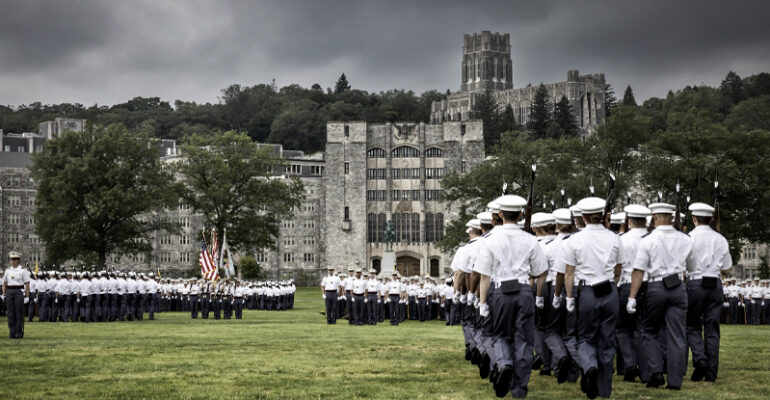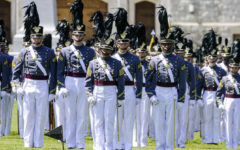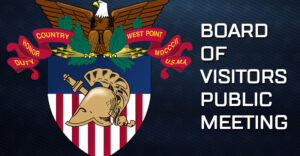West Point Needs a Reset
13 September 2024 2024-09-13 17:24West Point Needs a Reset
By Tony Lentini, USMA ’71
When I attended West Point back in the late ‘60s and early ‘70s, cadets used to joke that we got a “$50,000 education, shoved up our a** a nickel at a time.”
Times have sure changed. Today, the cost of an education at the nation’s service academies has risen to an estimated quarter-of-a-million dollars per cadet or midshipman, all of which is funded by our tax dollars.
In the past, such an investment was more than worthwhile; West Point has produced such luminaries as Presidents Grant and Eisenhower, World War II Generals MacArthur, Patton, Arnold and Bradley, and scores of other accomplished military, political and business leaders ever since its inception in 1802.
But in recent times, things have changed. Not only has the taxpayer cost of a West Point education risen, but the Academy’s moral and professional compass seems to have shifted.
The U.S. Military Academy was the nation’s first engineering school, and rightly so, because engineering is a crucial skill on the battlefield. Soldiers must plan and build fortifications, bridges and other infrastructure as well as find ways to destroy them.
But over the last few decades, the Academy has become more of a Liberal Arts College, offering battlefield-irrelevant course materials in such areas as Diversity, Equity and Inclusion, Critical Race Theory and Gender Studies. West Point now offers a minor in Diversity & Inclusion Studies.
Although sexual fraternization has been a problem ever since women were first admitted to the Academy in 1976, among its various “Affinity Clubs” West Point now sponsors a so-called “Spectrum Club” for homosexual and transexual cadets based solely on their sexual orientation. Presumably, such clubs for heterosexual males and females would not be tolerated.
The Cadet Honor Code used to be unequivocal: “A cadet will not lie, cheat or steal, or tolerate those who do.” The penalty for violating the code was expulsion.
Now, not so much. The Honor Code is still “managed” by cadets, but punishment for violators is now solely the Superintendent’s purview.
Football players involved in a recent cheating scandal were not only retained but permitted to play in public competitions, including the Army-Navy and Army-Air Force games, both of which they “won.”
An athlete-cadet watch thief caught on camera at the Post Exchange was allowed to graduate.
The Superintendent has characterized the Honor Code as “aspirational” rather than absolute. The same Superintendent recently excised the school’s “Duty, Honor, Country” motto from West Point’s mission statement.
Each cadet company now has cadet “Respect Officers” reminiscent of Soviet Political Commissars, to ensure that all bow to the Academy’s now-woke culture.
Admissions and advancement are now governed by race and gender over merit.
The school’s Diversity and Inclusion Department has been renamed (for political reasons) but still exists.
None of the speakers at last year’s Office of Diversity, Inclusion and Equal Opportunity Leadership Conference expressed any divergent views regarding DEI.
Boxing, a warrior’s sport if ever there was one, no longer is on the intramural schedule.
I was a cadet when the USS Pueblo and its crew were seized in international waters by North Korea. On the door to my barracks room, I rashly posted a map of Southeast Asia with a mushroom cloud replacing that communist country. It was captioned, “Make South Korea an Island.”
My tactical officer required me to remove my overtly political statement and write an essay on the U.S. military tradition of soldiers subservient to civilian control, as it was clear that the poster questioned Commander-in-Chief Lyndon Baines Johnson’s authority. I learned a valuable lesson from that.
Now, however, things are different. Overlaying everything at West Point today is politics–Leftist politics.
Upon graduation from West Point, all of us took an oath as commissioned officers to “…support and defend the Constitution of the United States against all enemies, foreign and domestic….”
Enshrined in that document among the very first of our unalienable rights is freedom of speech, yet classmate email lists maintained by the Association of Graduates routinely censor any discussion critical of the Academy’s and the military’s direction.
For example, I recently sent an email to my entire class that simply shared the website address of The MacArthur Society of West Point Graduates (www.macarthursociety.org), which was formed to push back against woke policies that many of us believe are undermining our alma mater’s mission as well as Army recruiting.
My class president censored the email, stating “I have reviewed the site and it’s (sic) information and I find it to be biased and highly political therefore not appropriate to be shared with the Class.”
This same class president emailed the class supporting the Superintendent’s decision to remove Duty, Honor, Country from the mission statement and regularly distributes policy positions of current Air Force Secretary and classmate Frank Kendall.
I have no problem with such communications, but opposing viewpoints also should be shared.
West Point staffers now routinely violate federal law: The Freedom of Information Act requires citizen queries to be answered within 20 working days, yet the Academy’s FOIA office now willfully ignores the law.
Judicial Watch had to sue to force West Point to share course materials promoting Critical Race Theory, DEI and other woke subjects.
I and graduate friends of mine have unanswered FOIA requests going back one, two or more years.
My own FOIA—to determine the fate of cadets who overdosed on fentanyl-laced cocaine on Spring Break two years ago—was completed by West Point in June of this year but now languishes in the “Initial Denial Authority” office at Ft. Belvoir, Virginia, 11 months after it was filed. The “Initial Denial Authority” refuses to respond to or acknowledge my emails and phone calls.
As a graduate and, more important, as a taxpayer funding these $250,000 educations, I have a right to know what punishment, if any, those drug-abusing cadets received. Did they graduate? Were they expelled and forced to repay their educational costs by serving as enlisted soldiers? Are drug abusers now permitted to serve in the military at all?
I don’t know. We don’t know. And West Point and the Army refuse to enlighten us.
So, here we are: West Point’s officer leadership willfully ignores federal law. And they’re getting away with it.
The same is true at our other service academies. This must change.
_
Tony Lentini is a 1971 West Point graduate. He served five years in the Army, attaining the rank of captain, and then had a successful career in the energy industry, eventually serving as vice president of public and international affairs at two independent oil and gas companies. He is a founding board member of The MacArthur Society of West Point Graduates.



















